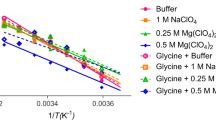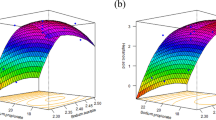Abstract
WHEN α-amino-acids are heated to 100–170° with heavy water and strong acids or bases, heavy hydrogen (D) is introduced in a stable or practically stable position in the amino-acid molecule1,2. The position into which D is introduced seems to be the C—H linkage at the α-C atom ; and further into the ring of some of the aromatic and the heterocyclio amino-acids.
This is a preview of subscription content, access via your institution
Access options
Subscribe to this journal
Receive 51 print issues and online access
$199.00 per year
only $3.90 per issue
Buy this article
- Purchase on Springer Link
- Instant access to full article PDF
Prices may be subject to local taxes which are calculated during checkout
Similar content being viewed by others
References
Gü nther, G., Diss. Leipzig (1937).
Krogh, A., and Ussing, H. H., C. R. Lab. Carlsberg, Ser. chim., 22, 282–287 (1938).
Addis, T., Poo, L., and Lew, W., J. Biol. Chem., 115, 11, 117 (1936).
Author information
Authors and Affiliations
Rights and permissions
About this article
Cite this article
USSING, H. Use of Amino-Acids containing Deuterium to follow Protein Production in the Organism. Nature 142, 399–400 (1938). https://doi.org/10.1038/142399b0
Issue Date:
DOI: https://doi.org/10.1038/142399b0
This article is cited by
Comments
By submitting a comment you agree to abide by our Terms and Community Guidelines. If you find something abusive or that does not comply with our terms or guidelines please flag it as inappropriate.



